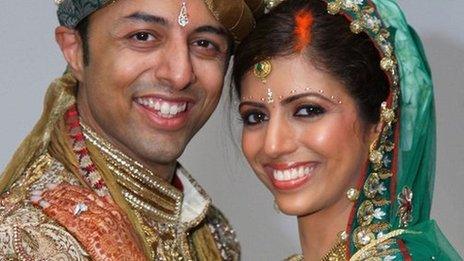Shrien Dewani murder trial: How prosecution fell apart
- Published
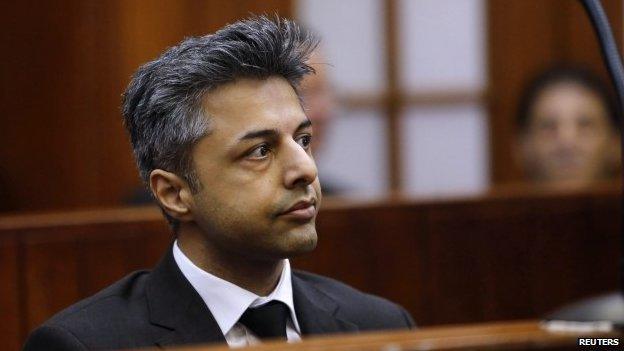
The prosecution case against Shrien Dewani - who has been cleared of arranging the murder of his wife Anni during their honeymoon in South Africa - floundered from day one of the trial.
A shock statement from Mr Dewani, disclosing details of his sexuality and relationship with his wife Anni, was given to the court before the prosecution had even begun its case.
Prosecuting lawyers had hoped to use that evidence against him by accusing him of arranging the murder of his new wife in order to escape a marriage he had felt pressured into.
In the days that followed, the trial judge rejected evidence from a male prostitute, which lawyers had claimed would illustrate Mr Dewani's motive for murder.
And in the ensuing weeks the credibility of evidence from both the police and Mr Dewani's alleged co-conspirators was called into question.
Judge Jeanette Traverso repeatedly expressed her exasperation at the late preparation of prosecution evidence, stating: "You have had four years to prepare."
At one point, she took prosecution lawyer Adrian Mopp to task, saying: "This is day 20 of the trial and the State is still scurrying around."
Here is an overview of how the prosecution case became unstuck, leading to the collapse of the Shrien Dewani trial.

Shrien Dewani's sexuality admission

At the beginning of the trial, Mr Dewani admitted he considered himself bisexual and his relationship with Anni had been volatile. He said she had wanted to call off their wedding.
The BBC's Africa correspondent Karen Allen commented at the time these revelations "may serve to neutralise" some of the press speculation about the case and police statements given by a gay escort, Leopold Leisser, who claimed to have spent time with Mr Dewani.
In the statement, Mr Dewani denied the charges against him, but revealed: "My sexual interactions with males were mostly physical experiences or email chats with people I met online or in clubs; including prostitutes such as Leopold Leisser." Mr Leisser was a key prosecution witness.
This admission was unexpected as Mr Dewani's lawyers had previously written to The Sun newspaper, which paid Mr Leisser for an interview, saying he had never been in contact with him.

Male prostitute's evidence cut short

It had been the prosecution's intention to argue Mr Dewani was leading a secret double-life and wanted out of his marriage, so arranged a staged hijacking in which his wife was killed.
But email evidence from Mr Dewani's laptop, in which the prosecution said admissions were made about whether he should get married or "come out", was ruled inadmissible by the judge.
She said Mr Dewani's sexuality had been disclosed in his plea explanation and the emails from 2009 had no relevance to the murder in 2010.
Prosecutor Adrian Mopp argued Mr Leisser's evidence should be allowed because Mr Dewani had told him he was either already or about to be engaged and could not find a way out of it without his family disowning him.
But the judge rejected this view.
William Booth, of the South African Law Society, said: "From a tactical perspective, it was important to deal with [Mr Dewani's] sexuality early on.
"At the end of the day, evidence of his sexuality wouldn't have been particularly significant in that if he is gay it's not a reason to kill his wife.
"The issue of motive isn't part of the elements of murder. It's usually used by the prosecution in an instance where the defence later argues no case or reason for someone to behave in a particular way."

Framing allegation
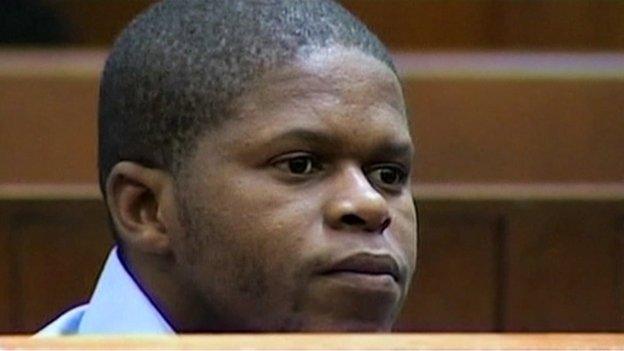
Taxi driver Zola Tongo had been billed as the prosecution's strongest witness, the only person to offer direct evidence that Shrien Dewani had offered to pay him to arrange Anni's murder.
He claimed Mr Dewani asked him to arrange the murder after he first picked up the couple from the airport.
But the court was told Tongo had admitted to a fellow convict in prison, Bernard Mitchell, the real plan had been to kidnap Mrs Dewani and hold her hostage and his accomplices had "jeopardised the whole plan".
Mr Dewani's lawyer said to Tongo: "You explained to him... the whole plan went off the rails when... one of them wanted to rape her. A quarrel ensued and she was shot."
The lawyer said Tongo had then told Mitchell he thought about blackmailing Mr Dewani but had been advised it would be better to frame him by telling police he had asked him to kill his wife.
Tongo denied he knew Mitchell and said his account was "all lies" but admitted initially denying involvement in the hijacking before changing his evidence to admit involvement and testify against Mr Dewani.
He said he did this "because what I did was wrong". He was jailed for 18 years, instead of 25, as a result of agreeing to testify.
His version of events also differed from established facts in the case - in phone records and on CCTV.
Tongo said the hijackers did not show up at the agreed time and he had received a text from Mr Dewani asking what was happening. Phone records showed there was no text, however.
He also testified he and Mr Dewani discussed the plan to murder Mrs Dewani while they sitting in his taxi at the hotel. CCTV shows Mr Dewani got out of the car immediately.

Phone call claims

Hotel receptionist Monde Mbolombo had admitted putting Tongo in touch with the hitmen and was granted immunity when he agreed to give evidence at the trial of Xoloie Mngeni, who was convicted of firing the shot that killed Mrs Dewani and jailed for life. He died in prison 12 days into Mr Dewani's trial.
However, Mbolombo admitted he had lied during Mngeni's trial when he claimed he did not know those involved in the murder were to receive 15,000 rand.
His testimony also conflicted with phone records and Tongo's evidence.
He said Tongo had received a call from Mr Dewani and kept telling the defendant: "I'm coming." But there was no mobile phone record for any call to Tongo from Mr Dewani at that time.
He also said it had been agreed the hijack would happen after the Dewanis had eaten at a restaurant, but Tongo insisted it was supposed to happen earlier in the evening and the Dewanis only went to the restaurant because the hijackers did not turn up at the agreed time.

Mziwamadoda Qwabe told the court he drove the taxi after he hijacked the vehicle with Mngeni.
He said there was never any discussion over how or where Mrs Dewani would be killed.
The court was also told about about discrepancies in his affidavit and his evidence in court over when the "hit" money was retrieved from the car.
Mr Booth said: "Tongo, Mbolombo and Qwabe were the people this case rested on, in particular Tongo as he was the person who set it all up.
"His evidence is crucial, without him nothing links Dewani to the whole thing.
"But they can't remember things, they contradicted statements they've made to the police and two negotiated plea agreements [for shorter sentences if they testified against Dewani].
"There's been a lot of criticism of the State prosecution, how they dealt with the case. The three most important witnesses let the State down.
"My concern is why, in the witness box, were there contradictions and poor evidence? It should have been checked out long before."

The wrong car

Evidence on where the fatal shot was fired from was important because Mr Dewani's lawyers argued Qwabe was the actual shooter and that, if this was true, this meant he lied during Mngeni's trial.
However, Warrant Officer Pieter Engelbrecht revealed the tests had been conducted in a different model vehicle in September 2014 and then in the original vehicle, but with different seats, during the month of the trial.
Mr Engelbrecht had testified in Mngeni's trial that the shooter had sat in the left front seat but in Mr Dewani's trial he agreed he did not have the necessary evidence to say that.
He said he still did not know which hand the shooter had used or where he was positioned and the original car seats had been unavailable as they were already court exhibits.
Defence lawyer Pieter Botha said Mr Engelbrecht's testimony was "a very clear indication that you are miles away from giving objective evidence".
Mr Botha said the front seat in the "similar" vehicle was tilted back and the back seat tilted forward and suggested this arrangement was made to suit what he wanted to prove.
Mr Engelbrecht said this was not his intention.
The prosecution had also introduced Mr Engelbrecht as a primer residue expert, but he said he was not and the judge did not allow him to give evidence on that matter.

Detective's Facebook comments

The impartiality and credibility of investigating officer Captain Paul Hendrikse was called into question by defence lawyer Francois van Zyl.
Mr van Zyl read to the court an entry Cpt Hendrikse had written on Facebook after Mr Dewani's extradition was initially denied in the UK.
He said: "Human rights?? Mental Health act? Fair trial? Are these just escape routes to avoid justice and have the learned people of our society been so misled by it that they make decisions hurting the victims of horrendous crimes even further. What has our world become?? I'm lost and slowly loosing [sic] faith."
Mr van Zyl also noted the officer was "friends" with Sneha and Mishma Hindocha [Mrs Dewani's cousins] on Facebook but Cpt Hendrikse insisted he remained impartial.
The police had originally stated the weapon used was a Rossi revolver but later said it was a Norinco pistol. This was changed without a correction affidavit and Cpt Hendrikse agreed "this should not have been done in this way".
The results of gun residue tests were also not made available to prosecutors in August 2014, despite having been carried out years earlier.
Cpt Hendrikse said this was an oversight but the judge was critical, saying: "This happened four years ago, police have had four years to investigate. After they have gone to all the trouble to get Shrien Dewani extradited, this should have been done."
Mr Booth said: "I think there were problems with the police investigation.
"Evidence with regard to where they were seated in the car and what happened with the firing of the firearm, that evidence came in very late."
- Published8 December 2014
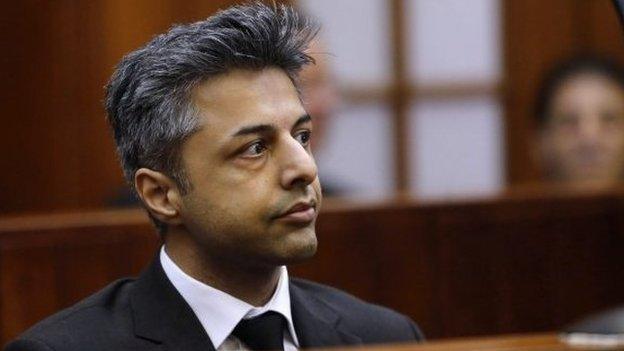
- Published8 December 2014
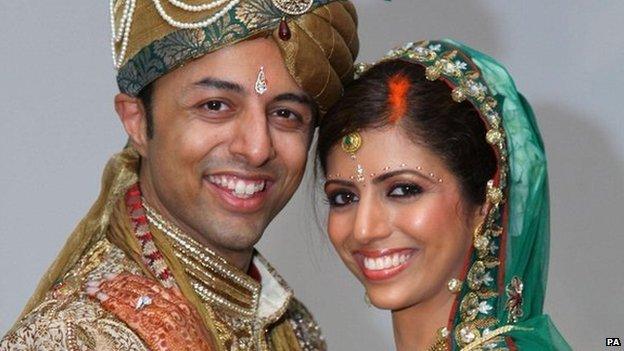
- Published8 December 2014
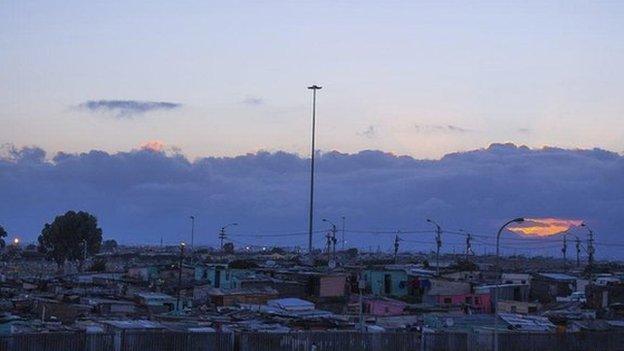
- Published8 December 2014
